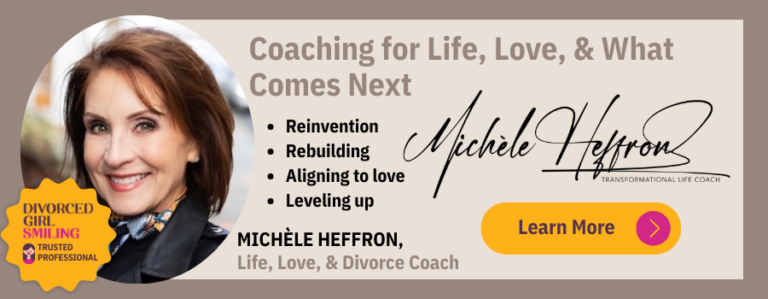Before becoming a life coach specializing in relationships and divorce, I served on the leadership team of a national nonprofit organization whose mission is to end domestic violence by educating people about the difference between healthy and unhealthy relationships. During this time, I learned so much about the difference between healthy and unhealthy relationships, along with signs of an unhealthy relationship.
In fact, for the first time, I was able to look back on my previous marriage and clearly identify with words what I had experienced—emotional and financial abuse. I still find it perplexing that it happened to me.
What I’ve learned is that abuse can happen to anyone and any time in life.
Abuse is indifferent to education level, socio-economic status, race, age, or gender; this goes for emotional, financial, and physical abuse. And no one can ever know the dynamics of another’s relationship. Most of us don’t realize that abuse is happening in our own neighborhoods, offices, or with family members.
In the intricate dance of love and companionship, it can be challenging to discern the line between a healthy and an unhealthy relationship. While no relationship is perfect, certain patterns of behavior can signal potential trouble. Understanding these warning signs is crucial for fostering a supportive and nurturing connection. In today’s message, we’ll explore ten indicators of an unhealthy relationship, shedding light on the importance of recognizing and addressing these issues before they escalate to abuse and potentially violence.
10 Signs of an unhealthy relationship
1. Intensity:
Healthy relationships thrive on balance and mutual respect. Intensity, however, can become detrimental when it leads to constant drama, heightened emotional states, or extreme highs and lows. Constant intensity can create an unstable environment, making it difficult for both partners to communicate effectively and maintain a sense of security.
2. Possessiveness:
A healthy relationship values individual autonomy and trust. Possessiveness, on the other hand, manifests as an excessive need to control or dominate one’s partner. This behavior can stifle personal growth, erode self-esteem, and ultimately lead to feelings of resentment and frustration.
3. Betrayal:
Trust is the cornerstone of any successful relationship. Betrayal, whether through infidelity, dishonesty, or broken promises, can severely damage the foundation of trust. Repeated betrayals erode the sense of security and make it challenging for the relationship to heal.
4. Isolation:
Isolating a partner from friends, family, or support networks is a classic sign of an unhealthy relationship. This behavior seeks to control the narrative and limit external influences, making it easier for the controlling partner to exert dominance. Healthy relationships encourage social connections and personal growth.
5. Manipulation:
Manipulation involves the use of deceit, guilt, or emotional pressure to influence the behavior of a partner. Whether through subtle tactics or overt coercion, manipulation erodes the trust and communication essential for a healthy relationship.
6. Sabotage:
A partner who intentionally undermines the other’s success or well-being is engaging in destructive behavior. This can take various forms, such as sabotaging career opportunities, undermining self-esteem, or actively working against personal goals. Support and encouragement should be the foundation of a healthy relationship.
7. Guilting:
Emotional manipulation often involves guilting, where one partner uses guilt as a tool to control the other’s actions or emotions. Guilt trips can be subtle or overt, but they consistently erode the sense of agency and autonomy within the relationship.
8. Volatility:
A relationship marked by extreme mood swings and unpredictable behavior can be emotionally exhausting. Volatility creates an atmosphere of instability, making it challenging for both partners to feel secure or communicate openly without fear of negative repercussions.
9. Belittling:
Healthy relationships are built on mutual respect and encouragement. Belittling behavior, such as insults, mockery, or demeaning comments, damages self-esteem and creates a toxic dynamic. Partners should uplift each other, not tear each other down.
10. Deflecting Responsibility:
Taking responsibility for one’s actions is crucial for personal growth and the health of a relationship. Deflecting blame onto the other partner or external factors is a clear sign of an unhealthy dynamic. Healthy relationships involve open communication and a willingness to address and resolve conflicts responsibly.
Everyone deserves a healthy relationship and recognizing the signs of an unhealthy relationship is the first step toward fostering a positive, supportive connection. If you identify these warning signs in your relationship, consider seeking professional help today or engaging in open and honest communication with your partner. If open and honest communication feels impossible and/or you feel unsafe in your relationship, don’t ignore the signs, and pretend that things might get better. They won’t! It may be time to take action and get help now before things escalate further.
Receive your copy of the 10 Signs of Healthy and Unhealthy Relationships click here.

Michèle Heffron is a life coach who specializes in relationships and divorce. She serves as a member of The Divorce Coalition and is a Trusted Professional with Divorced Girl Smiling. Michèle lives in Bellevue, Washington and serves clients in all 50 states.
Learn more about Michèle: www.micheleheffron.com
Schedule your free consultation with Michèle calendly.com/michele_heffron
Listen to her podcast: Getting to the Heart on Spotify or wherever you get your podcasts.





















